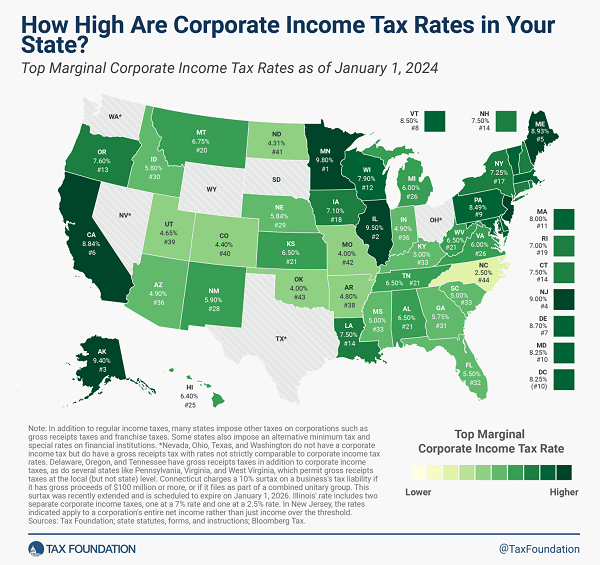Key Takeaways
- Loper Bright Supreme Court case - will it affect tax regulations?
- Tax Court judge says no biggie.
- Will taxpayers get less guidance?
- IRS new crypto 1099 rules require reporting of 2025 transactions.
- Taxpayer Advocate: IRS to implement automated "first time" penalty abatement.
- Buyback tax rules.
- California, New Jersey on tax hike train.
- National Creative Ice Cream Flavors Day.
Supreme Court’s Overturning of Chevron Could Cause Tax Shake-Up - Mary Katherine Browne and Nathan Richman, Tax Notes ($):
In a 6-3 decision in Loper Bright Enterprises v. Raimondo, the Court on June 28 overturned a 40-year precedent that directed courts to give deference to regulatory interpretations of ambiguous statutes as long as the regulators’ interpretations were reasonable.
...
“Loper Bright will create a sea change in tax law, an area of administrative law perhaps more dependent on regulations than any other,” David W. Foster of Kirkland & Ellis LLP told Tax Notes. “What is clear is that the days of judicial deference to any reasonable Treasury or IRS interpretation of the Internal Revenue Code are over.”
Chevron Ruling No Sea Change For Tax Court, Judge Says - Kat Lucero, Law360 Tax Authority ($):
The U.S. Treasury Department and the Internal Revenue Service have special competence in drafting tax regulations, so the Tax Court will continue to lend considerable credence to the agencies' rules, Tax Court Judge Elizabeth Ann Copeland said, speaking at New York University School of Professional Studies' tax controversy forum, held in New York and online.
What The Supreme Court’s New Curbs On Regulatory Power Could Mean For Tax Law - Howard Gleckman, TaxVox. "Repealing Chevron extends the Court’s recent enthusiasm for weakening executive branch power. But it may upend the way Congress writes tax law, create an administrative mess for Treasury and the IRS, and complicate life for taxpayers who crave and deserve legal clarity."
IRS Finalizes Crypto Broker Reporting
IRS Finalizes Broker Rules For Digital Asset Sales - Anna Scott Farrell, Law360 Tax Authority ($):
Under the regulations, digital asset brokers will be required to report their gross proceeds on the sale of digital assets for all sales in 2025 starting in 2026. Brokers also will be required to report tax information on the basis for certain digital assets starting in 2027 for sales in 2026.
Crypto to See Tighter Tax Rules Starting in 2026 - Paul Kiernan, Wall Street Journal:
Since the first cryptocurrency, bitcoin, was launched in 2009, the IRS has insisted that investors who make money by trading the assets must pay taxes—typically on the capital gain when a coin is sold at a profit. But it has never systematically gathered that information from the countless market intermediaries that enable crypto transactions. Meanwhile, much of crypto’s libertarian ethos revolves around creating a financial system that no government can control.
That combination has given crypto a certain allure for tax cheats.
...
The final regulations require reporting by brokers who take possession of the digital assets being sold by their customers. These brokers include operators of custodial digital asset trading platforms, certain digital asset hosted wallet providers, digital asset kiosks, and certain processors of digital asset payments (PDAPs). The majority of digital asset transactions today occur using these brokers. By focusing first on this group, the IRS intends these regulations to cover the greatest number of taxpayers while allowing the IRS and U.S. Treasury Department more time to consider the nuances of transactions involving non-custodial and decentralized brokers.
The final regulations do not include reporting requirements for brokers that do not take possession of the digital assets being sold or exchanged. These brokers are commonly called decentralized or non-custodial brokers. The U.S. Treasury Department and the IRS intend to provide rules for these brokers in a different set of final regulations.
Automated Penalty Abatement; Stock Repurchase Tax Rules
IRS to Automate First-Time Abate Program - Benjamin Valdez, Tax Notes:
...
The program allows taxpayers that haven’t received any penalties during the prior three years to request an abatement of penalties for failure to file, failure to pay, or failure to deposit. Under the current process, taxpayers must call the IRS to make the request.
Collins said she was surprised to learn that many taxpayers aren’t aware of the program. “I’ve been pushing this with the IRS,” she said. “It should be for everyone that meets the criteria.”
I'm not surprised at all. The IRS collects millions in penalties from taxpayers who are eligible for the waiver, just because the taxpayers don't know they can ask for it.
Related: Eide Bailly Penalty Help.
These final regulations require that the stock repurchase excise tax be reported on Form 720, Quarterly Federal Excise Tax Return, due for the first full calendar quarter after the end of the corporation’s taxable year, with the Form 7208, Excise Tax on Repurchase of Corporate Stock, attached. The Form 7208 is used to figure the amount of stock repurchase excise tax owed.
State Taxes: California Digital Tax Revives; New Jersey, No. 1.
California Digital Ad Tax Revived, Passed by Senate - Paul Jones, Tax Notes ($):
S.B. 1327 was brought to the Senate floor on June 27 and, after an impassioned appeal by bill sponsor Sen. Steve Glazer (D), was approved on a vote of 27 to 7 and sent to the Assembly. The bill wasn’t subject to the May 24 crossover deadline because of its urgency clause, but a source said at the time that it didn't have the votes to pass. Its failure to advance by that date was interpreted by observers as a sign it had died.
New Jersey Lawmakers Pass Highest Corporate Tax Rate in US - Danielle Muoio Dunn, Bloomberg ($):
The new “corporate transit fee,” pitched by Gov. Phil Murphy (D) earlier this year, passed out of the state Senate and Assembly on Friday. It adds a 2.5% surtax on top of the state’s 9% corporate tax rate for businesses with New Jersey net taxable income above $10 million. The roughly $1 billion in revenue expected from the fee was included in the state’s $56.6 billion budget, which Murphy said Friday he will sign ahead of the June 30 deadline.
Blogs and Bits
Personal assistant heading to jail for $2.7 million in embezzlement and tax evasion - Kay Bell, Don't Mess With Taxes. "The tax crime initially caught my eye, but what really drew me into the criminal case were the investigative reports’ characterization of the felon as a trusted employee and long-time friend of her employer-turned-victim."
Divorce and taxes: what you need to know - National Association of Tax Professionals. "A: For one child with 50/50 custody through the courts, only one parent can be the custodial parent for tax purposes if the parents do not live together. The custodial parent is the one with whom the child spends the most nights during the year."
Income Exclusions for Members of the U.S. Armed Forces - Ashley Akin, Tax School Blog. "For members of the U.S. Armed Forces serving in combat zones, the monthly compensation they earn while serving in the combat zone is exempt from federal income tax. However, combat pay remains subject to Social Security and Medicare taxes. Any part of a day spent serving in a combat zone is considered a full month for excluding the income."
Court Rejects Injunctive Relief for Tax Prep Business Stripped of Its EFINs - Parker Tax Pro Library. "A district court denied a request from a tax preparation business for a preliminary injunction to restore its electronic filing identification numbers (EFINs) which the IRS suspended due to what it believed were fraudulent deductions taken by customers of the business."
How to Get More Dollars Into Tax-Sheltered Roth Accounts - Laura Saunders, Wall Street Journal. "The main barrier to funding Roth IRAs and 401(k)s is paying taxes on dollars going into them. Contributions to traditional IRAs and 401(k)s, by contrast, are often tax-deductible. Nobody likes accelerating tax bills, especially when future tax rates are unclear."
Tax Crime Corner
IRS-CI case sends Round Rock business tax cheat to prison - IRS (Defendant name omitted, emphasis added):
According to court documents, Defendant did not file individual income tax returns from 2014 through 2019, nor did he pay income taxes for those years, despite earning hundreds of thousands of dollars from his business that sold an herbal extract known as “kratom”. Those businesses included K Botanicals, Round Rock Botanicals, Evil Monkey Tatoo and Unicorn Botanicals, with Defendant switching between them on a frequent basis, helping him to illegally avoid tax responsibilities.
“Defendant is a criminal who fired his bookkeeper when confronted about his scheme and lived a more luxurious lifestyle due to the money he stole from our nation,” said acting Special Agent in Charge Lucy Tan of IRS Criminal Investigation’s Houston Field Office. “Whether you are a career criminal or someone debating the merits of cheating on your returns for the first time, I recommend rethinking your actions. Our special agents are expert financial crime investigators, and it is just a matter of time before we uncover your illegal tax schemes.”
Defendant attempted to evade his income taxes by opting not to withhold federal taxes from his paychecks, operating the business under different names, dealing in cash, using business bank accounts to pay for personal expenses and lying to the IRS during an audit. In addition, Defendant did not pay his business’s employment taxes.
If paying employees in cash doesn't create informants willing to call the IRS on you, firing the bookkeeper who has the goods on you might do the trick. Lying to IRS agents doesn't help.
What Day is It?
It's National Creative Ice Cream Flavors Day, for those not celebrating Canada Day today. A scoop of garlic on a sugar cone, please.
Make a habit of sustained success.




